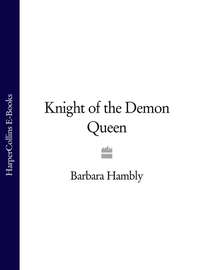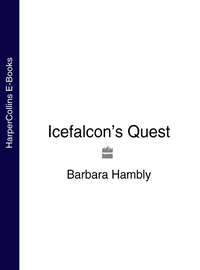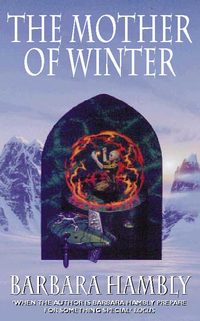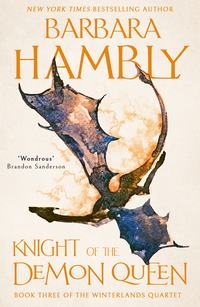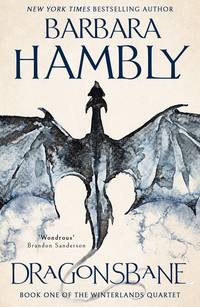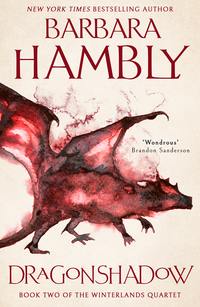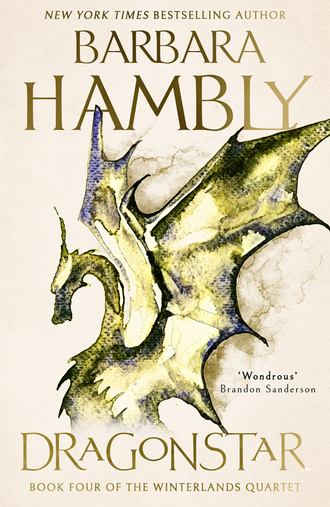
Полная версия
Dragonstar
He was aware of the man watching him down through the grille, and knew he’d carry word of it back to the guards.
Bugger, thought John, lying back on the verminous straw tick and closing his eyes. If they want to do this the hard way, let’s do this the hard way. Under other circumstances Ector of Sindestray, Councilor and Treasurer of Prince Gareth’s Council, might simply have bricked over the grille and let it go at that. But so long as Gareth was alive, this wasn’t possible. And the command to burn those who trafficked with demons had been instituted precisely to be sure that the physical body was destroyed beyond the demons’ use just as—and no later than—the departure of life and consciousness.
Would the Demon Queen still come, he wondered, if he now called on her name?
He was afraid she would.
That was the problem with demons. The wizard Caradoc had fallen into the trap of it, and started this whole deadly game. Once you called on them, you never knew what they would demand. Caradoc had probably only wanted a little more power. There were any number of ward-spells to hold demons at bay. True, all the grimoires ever written warned against calling on demons, ward-spells or no ward-spells, but Caradoc was vain of his abilities.
Caradoc’s ward-spells hadn’t worked. John still didn’t know why—at a guess, Caradoc didn’t, either. The demons had somehow reacquired power they hadn’t had for a thousand years, and nothing had stopped them so far, except the spells John had bought from other demons …
Always a bad idea.
John didn’t put up a fight when the Councilor’s guards came for him. From his days of friendship with Gareth he knew the layout of the prison tower: it was the ancient core of Bel’s original palace. He knew there was no way to flee. He would only be hurt, probably badly enough to prevent a break later, between the old gate on the Queen’s Lane and the square before the city’s market hall where public burnings were customarily conducted. It wasn’t hard to act as if he were too exhausted and debilitated to be any threat when the guards cut off his hair and dressed him in the thin white shift of the condemned. A squad of six soldiers in the red cloaks and trousers of the House Uwanë came to do this: “You’re joking,” said John as they all came down the ladder into the cramped cell. “Somebody thinks I could take on five?”
His hands were manacled behind him. Just as well he hadn’t put up a fight in the cell, he thought—always supposing there was room for one—as he was manhandled up to the corridor above, and led along to the watchroom. Whoever built the place probably had him in mind. There wasn’t an inch of cover. The walk, over flagstones worn uneven by two centuries of military boots, seemed two or three times longer than it had when they’d brought him in; he was dizzy when they reached the round stone room at its end. Hunger and dehydration made all things unreal, and he felt unable to picture anything clearly beyond each separate moment. The details of his capture and imprisonment blurred and segued into the battle that had preceded it: a battle against garishly painted men possessed by demons and wielding the horrible weapons of the bizarre, waterlogged city in another world where he’d gone to find Corvin NinetyfiveFifty.
In the aftermath of the carnage from which he’d rescued the little scientist, he’d opened the dragonbone box and dropped into it the demon’s golden beads. Corvin had screamed once, and whirled into the tiny container like smoke. Later, John had stepped through a door in the flooded subway tunnels—a door marked with a demon rune—and had been in the King’s city of Bel again.
And in the hands of those who knew only that he’d worked at the behest of the Demon Queen.
Only the hunter’s instinct that had kept him alive for thirty-nine years in the Winterlands let him focus his mind on details now: how close together the guards walked, how many doors were on each side of the stone-flagged passageway, and whether the men holding the wrist-chains did so attentively or not. His dizziness lent a dreamlike quality to the walk, and for an awful moment, as the leader of the squad opened the door into the watchroom, John expected the Demon Queen to be waiting for him there, smiling …
She wasn’t. Instead, the demon Amayon sat there in the watch captain’s big chair, and beside him stood Lord Ector of Sindestray.
How John knew this was Amayon he wasn’t entirely sure, especially without his spectacles. But he knew. The demon had been his guide through the doors of three Hells, and he’d seen him in several different guises. Most of the time there he’d worn the shape of a beautiful girl—he’d never given up his efforts to seduce John. But on occasion he’d occupied the body of the beast John had ridden through the red and black horror of the Hell of the Shining Things.
At the moment, Amayon was wearing the body of the dead Lady Trey.
It was the closest John came to being sick with sheer shock.
The blue eyes met his, unmistakably the demon’s eyes. The red lips of the thoughtful, rather shy girl John had known curled in a lazy smile, daring him to speak.
“I’m told you refused to drink the water that was given to you this morning,” said the King’s Treasurer, folding his chubby arms. Ector of Sindestray was built along the lines of a tree stump, clothed in the blue and white velvet of his House and made more square yet by an enormous set of Court mantlings that draped around him like an embroidered curtain. His gray curls were worn long, after the fashion of the oldest Houses in the Realm, and dressed as if for a State occasion. He smelled of scorched hair and pomade.
“I wasn’t sleepy,” said John. There was no point now in husbanding his strength or reckoning chances for an escape in the light of the terrifying enlightenment about just which demon had taken over the body of the dead Lady Trey. He guessed what was coming, and despaired
Ector glanced across at Amayon, who was stroking the round belly of her pregnancy. When she had died, Trey had been carrying Gareth’s second child. When the demon guide had betrayed John to Ector, he had worn the form of a slim, curly-haired boy of fifteen or sixteen—Ector had seemed at the time to believe the boy was his nephew, an illusion John guessed the demon had planted in the older man’s dreams. Amayon caught John’s eye and winked at him, then turned back to Ector and nodded. Ector gestured to the squad captain, and though John knew perfectly well that the outer door of the watchroom was barred, he hooked his bare foot around the booted one of the man behind him, tripped him, elbowed the next man holding the chains that bound him, and made a run for the door, all while the other members of the squad were picking up the clubs that lay on the watchroom table. There was nowhere to run and pretty much no hope of getting out of it at this point, but he couldn’t go without a fight.
As the blows hammered him and his consciousness fractured away, he heard Amayon laugh.
The Demon Queen waited for him in that clouded gray borderland on the other side of the pain: Don’t be a fool, she said.
I’m doin’ me damndest not to be, he replied, and her pale mouth tightened. He had a dim awareness of being roped to something—a ladder?—and carried shoulder high, but it was all hazy now, and all he saw was her face.
You’ll let others die, because of your stubbornness?
Lapsing entirely into dream he found himself momentarily in Gareth’s room, windows opening onto the terrace of the Long Garden to admit the smoke of plague-pyres still burning beyond the palace walls. Gareth slept, a heavy and unnatural sleep, his graying, thinning hair scattered on the linen of the pillows and his face furrowed with concern even in sleep. Trey sat beside him, the demon-Trey, Amayon-Trey, robed in royal red and white with her small jeweled hands resting on her swollen belly. Another man was in the room, and John felt again that cold, sick jolt of shock, for he recognized Gareth’s father, the old King Uriens. The King’s mind and consciousness had been eroded, stripped away, reduced to childhood five years ago by the spells of the witch Zyerne, but now he moved briskly. The blue eyes that had seemed so puzzled during last summer’s rebellion were bright, sparkling with demon fire. His lips curved under the fleecy amber curls of his beard. “Do you think he’ll be surprised?” The King nodded down at his sleeping son. Trey’s evil grin echoed his own.
“Why should he be? If old Bliaud the Wizard can wake a girl from the dead—not to speak of her sweet little son”—she patted her belly complacently—“why shouldn’t he be able to wake old Grandpa from mere imbecility?” And she reached up to tweak the King’s gold beard. “The people will be delighted. I’m sure after the rebellion of his cousin, and plague, and his precious Dragonsbane turning out to be in league with demons, Gareth will leap at the chance to step down from the throne and out of the council-chamber, and go back to collecting ballads.”
They both laughed, the ribald gloating mirth of demons, and John tried to cry out, as if under the muffling weight of sleep.
“They are my enemies, too, my love,” whispered the Demon Queen. She stretched out beside him on the ladder that the guards bore through the barred and guarded gate of the Old Palace, down the cobbled slope of the Queen’s Lane, where the crowds trampled last week’s snow to thin mush. The air was bitter on his flesh under the thin linen of the shift, and through it he could feel the heat of her flesh. “Folcalor and the one he feigns to serve, the Hell-Lord Adromelech, imprisoned me and mine in the Hell behind the Mirror a thousand years ago. What makes you think I would not do all in my power to avenge myself on them for that defeat? What makes you think I would not help you against them, if you will help me?”
Her fingers stroked his cheek, touched the silvery runes she’d written on his flesh when first he’d sought her help behind the Burning Mirror. The vision changed, and he saw his sons.
They stood on the wall of Alyn Hold in the Winterlands of the North, the place that was his fortress and his home. His heart leaped at the sight of Ian, whom he had last seen fragile and wasted, battered by the aftermath of demonic possession as Jenny had been battered. Ian was on his feet, and though thin and too serious for a thirteen-year-old, he looked well. Adric stood beside him, sword in hand—a boy’s sword, but though only nine he handled it like a man—and they were looking down over the battlement. Behind them the roof of the kitchens had been burned, and marks of fire scored the stone walls. Men moved about outside the walls, bandits, besieging the Hold as it had been besieged many times since the power of the Kings had waned in the North. But there was something else in the smoke that wreathed the burning village of Alyn, something fearful that scuttled like a huge rat among the smoldering houses. Something that defied all John’s efforts to watch.
“Can you see it?” Ian whispered, and his young brother shook his head.
“It spoke to me last night, though,” breathed Adric. “Spoke in a dream. Said I should kill you, and run down and open the gates. I told it to go bugger itself. It did.” The boy looked queasy. He was John’s son, in his red-brown coloring, and even more the grandson of old Lord Aver, stocky and barrel-chested already, though like the black-haired and blue-eyed Ian, he had John’s thin-bridged curve of nose. “But it still kept looking at me, and laughing; waiting for me to get my sword and kill you. Only I knew even then that you wouldn’t really die.”
“No,” said Ian quietly. “No. And that’s what it’s waiting for.”
One of the guards bearing the ladder stumbled; John felt the cold again, and heard the crowd shouting, their voices bouncing off the walls of the tall houses around the market square. Looking up, he saw the cold gray of the birdless winter sky.
Then the sky turned to darkness, the darkness beneath the earth. Something in the smell of the wet stone, coal smoke, and cooking thick with grease spoke to him of the Deeps of the Gnomes. Ylferdun, he thought. The Deep beneath Nast Wall. Its gates lay a half-day’s walk from the King’s palace in Bel, one of the great strongholds of the Gnomes in the West of the World.
The place he had gone to five years ago, to fight the dragon Morkeleb, with such curious results.
He smelled blood, too, and the sulfur-stink of blasting powder. Through the Hell-Queen’s spells he saw Jenny in the darkness, broken and bleeding in a hollow of the stones. Morkeleb the Dragon was somewhere near—he knew this as one knows things in dreams—but the black dragon had been trapped like her when the gnomes had blasted the mine tunnel.
She is dying, said the Demon Queen. The gnomes shot her with arrow poison. This, too, was the work of Adromelech and his minions. None knows she is there but the demons … and now you.
John’s mind cleared, and he heard again the shouting of the crowd. He was bound to the stake—he’d been dimly aware of the six guards doing it, though it had felt like someone else’s body through the cloudy horrors of his visions. The cords cut into his arms and ankles and throat, and the air was ice-water cold on his flesh and the raw skin of his scalp. Ector of Sindestray was reading the charges, savoring each with the morbid relish of a doomsayer who has been proven right. “He has trafficked with demons …”
Even had he been inclined to, John couldn’t very well argue with him.
It was to defeat this other lot of demons, see …
Who would believe that, except Gareth stupefied in his crimson chamber? And maybe the Master of Halnath, wherever he was. But the Master of Halnath, the scholar-lord Polycarp who was Gareth’s cousin, had voted also for John’s death, knowing the things that had been done in the past by those who dealt with demons.
It was to save Jen, and me son; to keep them from being possessed by demons who would use their wizardly powers …
But those who called upon demons to aid them frequently did so out of the best of motives.
Such as now.
It was Amayon, bright-clothed in garnet velvet and sparkling with jewels and malice, who handed Ector the torch which he drove into the kindling.
At this distance John couldn’t see clearly, and the crowd beyond that flame-like crimson form was only a blur. But he heard their voices, wild over the cracking of the fire. Furious voices, relishing as Ector did the vindication of themselves. They’d been told that the plague was his doing, or the doing of the demons he’d worked for, and they were doubly angry, for there had been a time when he’d been popular in Bel. Dragonsbane—the only man living who had slain a dragon. He had fought the demon-possessed dragons that flew down at the command of the demon mage Caradoc; he had defeated them.
“… pawn of the Hellspawn,” Ector was shouting above the rushing crackle of oil-soaked tinder. “Author of the plague that has swept this land …”
The smoke billowed thick and greasy. The heat was suffocating, and in the smoke she took shape. Beautiful and hideous, wrought of fume and fire, she held out her hands to him, waiting for him to call her name.
I won’t. He closed his eyes—not that that did a lot of good; he knew she was still there—and turned his face aside. Airless, all-encompassing heat and pain. I won’t. I will die, and Jen and the boys and all the Realm die with me …
Someone screamed.
He thought, Do they see her? and someone else took up the shriek. More howls—terror, panic. Wind bent the flame around him, whirled the smoke, and he opened his eyes and saw a dragon, huge, fifty feet or more and with a wingspan twice that, silver-streaked and tabbied with black and opal-green blazing eyes. It was almost on top of him already, and he could do no more than stare up at it in shock as the silver claws lashed down, caught him up, stake, ropes, and all, scattering burning hunks of wood and hay over the heads of the trampling crowd. The beating shadow of wings, the flash of the winter sunlight as they rose above the city’s walls and the bitter, freezing cold after the fire’s heat. With his hands still tied, John felt a stab of pure dread that the dragon would drop him—Fat lot of difference that would make, given the day I’ve had so far—and turning his head he saw the city fall away, mossy ice-slicked roofs and bare trees; city fields and the silver loop of the River Clae, shining in the Magloshaldon woods. Brown fields, then brown steppe, then gray sheets of cloud that enveloped them like damp muslin and cold that shredded his bones.
The dragon carried him tucked up under its breast, and without the heat of its flesh John thought he probably would have slipped away into death from the cold, Which I wouldn’t have bet two coppers on last night …
Weightless exhaustion. Consciousness that came and went, slipping away to drop him suddenly back to an awareness of hanging suspended in damp gray clouds, over a barely glimpsed landscape of formlessness below. He was only marginally conscious when the dragon descended to a gray-yellow desolation of sand and scattered boulders, of flint hills without vegetation and of twisting scoops of pebble-filled stone that had been watercourses long ago. These he saw only dimly, for the gray light was fading, and his eyesight wasn’t good enough to discern details. On a wide plateau in the desolation stumps of pillars marked where a city had stood. Crumbled foundations and lines of broken walls surrounded a stone platform two hundred feet by nearly five, a square rock island in the sand—even he couldn’t miss it.
The dragon balanced in the air like a kite and, reaching down, laid John on the ground before the remains of the platform’s wide stair. Evening turned the vast sky yellow, lilac-stained and fading. John felt the stone under him chill as snow through the torn rags of his shift, and knew the night would be brutal. He couldn’t imagine where he was, or how far they had come:
Please don’t make me walk home.
Still hovering weightless above him, the dragon extended its swan-like neck and with a bill like Death’s scythe bit through the ropes that bound him, the chains that fastened his wrists. Then it ascended with no more flurry than a cloud of smoke, wheeled on its silken wings, and flew away toward the west.
Aching with cold, with bruises, with hunger and exhaustion, John raised himself to one elbow and shouted, “CORVIN!” His voice echoed hoarse in the emptiness, not loud enough to startle rabbits, had there been any. The ancient authorities—Dotys, and Gantering Pellus, and others who’d written of dragons—said that to name a dragon’s true name would call it, though these true names were in fact airs of music …
Save a dragon, slave a dragon, went the ancient granny-rhyme: to rescue it from death put it in bondage to its rescuer.
John had never quite known whether this applied to ordinary people—he’d only ever seen wizards do it—and he prayed his guess about the dragon’s name was correct. “Corvin NinetyfiveFifty, by your name I charge you, come back!”
He saw the flash of distant silver in the last western sunlight, and the glittering shape of the dragon returning. But before it reached him he fainted from exhaustion and cold.
TWO

IN THE DARK beneath the earth, Jenny Waynest dreamed of the Dragonstar.
John had told her about it, on and off, for three years, and in her dream they lay together on the platform he’d built above the moss-fouled leads of the Alyn Hold tower, on one of those hot summer Winterlands nights when the whole world breathed magic and the stars leaned down close over the desolation of moor and stones. “A thousand years ago was the last time it showed up, when Ennyta the Great was the King of Ernine,” John was saying to her. The starlight flashed in the round lenses of his spectacles, and his voice was deep and velvety with odd undertones of huskiness to it, like rocks in a plowed field. Jenny would know it in her dreams, she thought, until she died. In this dream he had half a dozen of his crumbling old volumes scattered about him: he’d spent a lifetime ferreting them from the ruins of old fortresses and towns. The lantern he’d brought up to read them by had gone out.
“Accordin’ to Dotys, anyway—if that thing I have really is a fragment of his Second History—it reads like Dotys, no error, the fussy old prig. He claims he was writin’ from the Golden Chronicle of the Kings of Ernine, but—”
And Jenny asked, “What does he say about it?” because even in her dream John was apparently ready to explain at vast and meticulous length why he thought the author of the forty or so sheets of mildew-stained vellum he’d bought from a peddler were in fact Dotys’s Second History and not one of the other ancient authors’ and she wanted to hear about the star.
“Well, anyway, it’s a double-headed comet,” John said, called back from historical exegesis that could easily have taken the remainder of the night. “The first comet showed up in spring, and the second, in the same place in the sky, in fall. The dragon’s head an’ his tail, they said.”
On the southern horizon a pale streak showed where the sun was dozing, and all around them the cornfields of Alyn Village resounded with the twitter and warble of sleepless summer birds. In her dream, Jenny still had magic. She could feel the radiance of it, glowing golden in her bones.
“Accordin’ to my calculations …” He rolled over and grubbed among his books for a much-scratched wax tablet. Only Jenny’s mageborn eyes could have made out the scribbles on it, in the starlight. “… the first head should show itself, the year after next, right there in the Sign of the Dragon …” He put his head close to hers so that she could site along his pointing finger at the cluster of stars hanging low above the toothed black notches of the Wolf Hills. They had been together a dozen years on this particular night, but she still loved the smell of his flesh, and was deliciously conscious of the warmth of his shoulder against hers.
Oh, my love, how could I have turned away from you?
Shadow folded around her, like cradling hands. Morkeleb the Dragon had said to her once, Endure, and she now tried to say to him, I will, my friend. The dream faded away. She became aware that she was underground, in darkness, in the gnomes’ Deep at Ylferdun. That she was dying. Around her the darkness of the Deep was very cold. She was conscious—from what felt like a great distance away—of lying on stone. Gritty dust clogged her throat and her nose, and a small star of cold pain radiated from her left shoulder, pain that no longer seemed to be part of her body. She had been shot with a poisoned arrow, she remembered. Morkeleb had come to save her, whipping down through the passageways of the mines that lay below and to the north of Ylferdun Deep. But it had been a trap, and the gnomes had set off an explosion, caving in the tunnel around him with the blasting powder.
She felt his mind reach out to hers.
Endure till I come. He had said that to her before, when they had parted after the loss of her magic, in those terrible days when she could meet John’s silences and anger with nothing more than silence of her own.
No, she thought now. Morkeleb would try to use magic, the strange powers of a Dragonshadow, to save her and himself. Magic is the heart and the flesh of dragons, and she knew there were demons in the Deep, waiting for him to do just that. In the summer just past she had seen how the demons could use the magic of a wizard as a bridge into that wizard’s mind and flesh, thrusting aside all protective spells as they had never done before. Thus the demon Amayon had entered her. Back when I HAD power, she reflected, without even bitterness, now. The demon lord Folcalor had come close to conquering the Realm of Bel through the wizards he had seized. Had he not, for reasons of his own, chosen to imprison the souls of the mages thus possessed rather than simply drive them out to dissolve, Jenny knew she would never have regained her body and her life.


